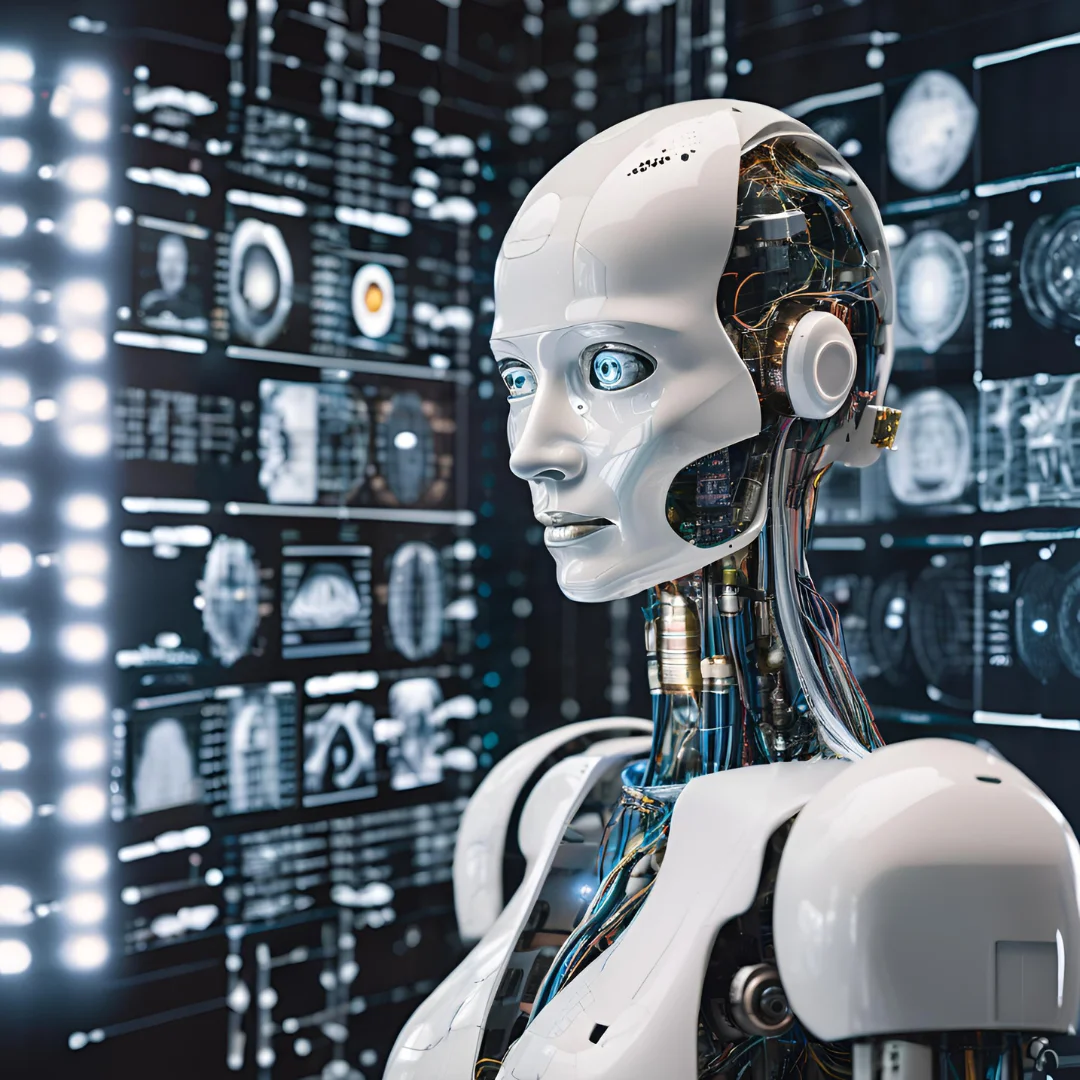Artificial Intelligence (AI) has rapidly progressed from a theoretical notion to a transformative power that is influencing practically every aspect of our daily lives. AI is revolutionizing industries, from healthcare to finance, education to entertainment, and providing unprecedented possibilities. Nevertheless, it also poses substantial challenges that must be addressed to ensure its responsible utilization. This comprehensive blog will delve into the current state of AI, its various applications, ethical implications, and what the future holds in store.
Understanding Artificial Intelligence
Artificial Intelligence describes the replication of human cognitive abilities by machines, particularly computer systems. This encompasses learning (acquiring knowledge and guidelines for utilizing that information), reasoning (applying those rules to draw approximate or definite conclusions), and self-improvement. AI can generally be divided into two main types:
-
Narrow AI: Specialized AI systems are crafted to handle specific duties, like recognizing faces or browsing the web. These targeted technologies have become widespread in contemporary applications and demonstrate exceptional proficiency in their designated roles.
-
General AI:Emulating the cognitive prowess of humans, this form of artificial intelligence strives to mirror our mental capacities. Despite its ambitious goals, General AI remains largely conceptual, not yet manifested in practical applications.
Applications of AI
AI's capabilities span a wide range of sectors, transforming industries and enhancing productivity. Here are some critical areas where AI is driving substantial advancements:
1. Healthcare
AI is transforming healthcare by enhancing diagnostics, personalized treatment plans, and patient care.
-
Diagnostics: AI-powered tools can meticulously examine medical scans, including X-rays and MRI images, and pinpoint health issues, such as cancer, with impressive precision, helping to identify problems at the earliest stages.
-
Personalized Medicine: Personalized medicine powered by AI can revolutionize healthcare. By decoding an individual's unique genetic makeup, AI-driven analysis can precisely guide the selection of treatments, optimizing their effectiveness and minimizing adverse reactions. This transformative approach promises more personalized and effective care, paving the way for a future where each patient's needs are uniquely addressed through the power of advanced technology.
-
Robotic Surgery: Robotic technology empowered by artificial intelligence supports medical professionals in conducting delicate and less intrusive surgical interventions, which in turn enable quicker patient recovery and fewer postoperative issues.
2. Finance
AI is revolutionizing the finance industry by improving risk management, fraud detection, and customer service.
-
Risk Management: AI-powered systems meticulously examine extensive data sets, enabling them to forecast market patterns and evaluate potential risks. This equips financial organizations with valuable insights to guide their decision-making processes effectively.
-
Fraud Detection: AI-powered systems can swiftly identify unusual financial transaction patterns and promptly flag any potential fraudulent activities as they occur, enabling quick intervention and prevention of losses.
-
Customer Service: Artificial intelligence-driven chatbots and virtual helpers offer streamlined and customized assistance, enriching how people interact with technology.
3. Education
Artificial intelligence is revolutionizing the field of education. It's enabling customized learning journeys for each student and streamlining routine administrative responsibilities. This technology is transforming the educational landscape, offering more personalized and efficient ways to support student growth and success.
-
Personalized Learning: Personalized learning platforms powered by AI tailor the educational experience to each student's unique needs, adjusting the content and pace to optimize their progress.
-
Administrative Automation: AI streamlines tedious administrative duties, such as assessing student work, organizing schedules, and record-keeping, allowing educators to focus more of their energy and effort on teaching and supporting learners.
-
Virtual Classrooms: Virtual classrooms powered by AI technology open up new possibilities for interactive and engaging learning experiences, bringing education within reach of students across the globe.
4. Transportation
AI is at the forefront of transforming the transportation industry through autonomous vehicles and smart infrastructure.
-
Autonomous Vehicles: Autonomous vehicles harness the power of artificial intelligence to guide their movement, make judgments, and enhance road safety by minimizing human-made mistakes. These cars and trucks can navigate independently, making real-time decisions to ensure a safer journey for all.
-
Traffic Management: Intelligent technologies scrutinize traffic patterns to streamline commutes, alleviate gridlock, and bolster urban transportation efficiency.
-
Predictive Maintenance: Intelligent systems continuously assess vehicle performance, foreseeing necessary maintenance tasks. This proactive approach minimizes disruptions, ensuring optimal operational productivity.
5. Entertainment
Artificial intelligence is transforming the entertainment landscape by empowering creators, tailoring recommendations, and elevating audience engagement. Through innovative technologies, this dynamic field is redefining how we discover, consume, and interact with various forms of entertainment, ushering in a new era of personalized, immersive experiences.
-
Content Creation: Artificial intelligence (AI)-generated literature, art, and music is expanding the creative possibilities and providing new kinds of entertainment.
-
Recommendation Systems: AI is used by streaming services like Netflix and Spotify to assess customer preferences and make tailored content recommendations.
-
Gaming: AI makes video games more realistic and interactive, resulting in dynamic and immersive gaming environments.
Ethical Considerations and Challenges
Even if AI has a lot of promise, there are significant ethical issues and problems that need to be resolved in order to assure its responsible development and application.
1. Bias and Fairness
Biases in training data can be inherited and amplified by AI systems, producing unfair and discriminatory results.
-
Bias in Data: Algorithms produced by AI systems that are trained on biased data will likewise be prejudiced. This has the potential to maintain already-existing disparities in the legal system, lending, and employment.
-
Fairness in AI: Carefully choosing and preparing training data is necessary to ensure fairness. AI systems also need to be continuously monitored and adjusted to reduce bias.
2. Privacy and Security
AI's ability to process and analyze vast amounts of data raises significant privacy and security concerns.
-
Data Privacy: To preserve privacy, user consent and transparency are required when collecting and using personal data by AI systems.
-
Cybersecurity: Cyberattacks may target AI systems, compromising private data and interfering with vital services.
3. Accountability and Transparency
Determining accountability and ensuring transparency in AI decision-making processes are crucial for building trust and credibility.
-
Black Box Problem: Deep learning models in particular are examples of AI systems that function as "black boxes," making it challenging to comprehend how they make judgments.
-
Explainability: For accountability and trust to exist, techniques to improve the interpretability and transparency of AI choices must be developed.
4. Job Displacement
The automation of tasks by AI poses a risk of job displacement, particularly for routine and repetitive jobs.
-
Reskilling and Upskilling: To equip the workforce for the evolving nature of work, it is imperative to allocate resources towards reskilling and upskilling initiatives.
-
Human-AI Collaboration: Stressing AI's capacity for human-machine collaboration can boost output and open up new career prospects.
Conclusion
Artificial intelligence is a game-changing technology that presents previously unheard-of possibilities in a number of industries. It has enormous potential to improve transportation, entertainment, healthcare, finance, and education. But for AI to be developed and used responsibly, it must address the ethical issues and problems that come with it, such as bias, privacy, security, responsibility, and job displacement.




